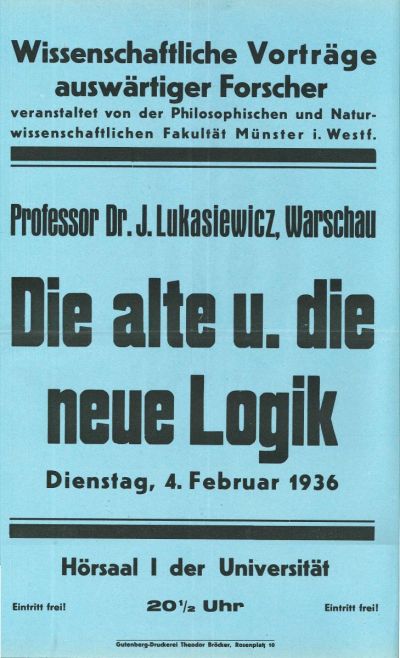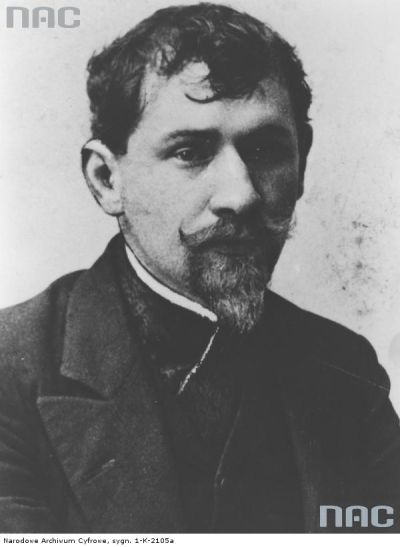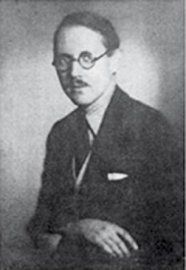Jan Łukasiewicz

It is a more than astounding fact that a former Polish Ministry of education and rector of Warsaw University was awarded an honorary doctorate in Nazi Germany in 1938. Furthermore he was still lecturing at Münster University in spring 1936; and last not least he survived the final years of the war with the support of friendly German mathematicians.
Jan Leopold Łukasiewicz was born on 21st December 1878 in Lemberg (Lwów), the then capital of the Austrian province of Galicia. Even though his father Paweł was a captain in the Austrian army and his mother Leopoldine, the daughter of an Austrian civil servant, the family only spoke Polish at home. After completing his studies at the humanist grammar school in 1887 he first read law, then mathematics and philosophy in Lemberg. He studied for a doctorate under Kazimierz Twardowski and was awarded his Ph.D. title in 1902 with a special mention “sub auspiciis Imperatoris” (under the auspices of the Kaiser), as well as receiving a doctorate ring studded with diamonds from Kaiser Franz Joseph I. Between 1902 and 1906 Łukasiewicz continued his philosophical studies abroad, especially in Berlin and Leuven. In 1906 he qualified as a university professor in Lemberg, where he was a freelance lecturer until he was appointed an associate professor in 1911.
In 1915 the Central Powers (the German Reich and Austria-Hungary) appointed him to the reopened Warsaw University. In 1918 he was made a ministerial director in the Polish Ministry of Education and from January to December 1919 he was the Minister of Education in Paderewski’s cabinet. Łukasiewicz was a professor for mathematical logic and basic research at Warsaw University from 1920 until the German invasion of Poland in September 1939. During this time he was elected Rector of the University on two occasions (1922/23 and 1931/32). Along with Stanisław Leśniewski, Łukasiewicz was one of the leading minds in the famous Lemberg-Warsaw School of Logic and Scientific Theory, which also included such outstanding academics as Alfred Tarski and Andrzej Mostowski. Łukasiewicz’s students included Mordechaj Wajsberg, Zygmunt Kobrzyński, Stanisław Jaśkowski, Bolesław Sobociński, Jerzy Słupecki and Józef Maria Bocheński.
One of Łukasiewicz’s closest friends was the German theologian and mathematician Heinrich Scholz (1884-1956), who held the first chair of mathematical logic in Germany at the University of Münster. The two logicians upheld an intensive exchange of academic knowledge between Munster and Warsaw. This was linked with mutual lecture journeys and joint research projects. In February Łukasiewicz was invited to give four highly esteemed lectures by the faculty of philosophy and natural sciences at the University of Minster. On 20th December 1938, amid increasing German-Polish tensions, Łukasiewicz was awarded an honorary doctorate by the faculty of philosophy at the University of Münster for services to establishing mathematical logic in Germany and the mathematician Gottlob Frege. The German ambassador Hans Adolf von Moltke awarded him the honorary certificate at an official ceremony in the German Embassy in Warsaw. The notabilities present at the ceremony included the rector of Warsaw University and other prominent representatives from the academic and political worlds, as well as Adolf Kratzer, the Dean of the faculty of philosophy at the University of Minster, and Heinrich Scholz.
Łukasiewicz’s apartment in Warsaw was completely wiped out by German bombardments in September 1939, and his complete library, correspondence and manuscripts were all destroyed by fire. With his wife Regina Barwińska he managed to find a provisional home in a boarding house for academics. Since the University had been closed by the German occupation forces Łukasiewicz was also in a very precarious financial situation. Thanks to help from Heinrich Scholz, the philosopher Jürgen von Kempski and others, Łukasiewicz managed to find a post as a translator at the Warsaw City Archive. In addition he received financial help from Scholz via the German Red Cross. On Scholz’s initiative he was also offered a post at the so-called “Institute for German East Work” but he turned this down on political grounds. Łukasiewicz taught secretly at the Warsaw Underground University (Tajny Uniwersytet Warszawski).








